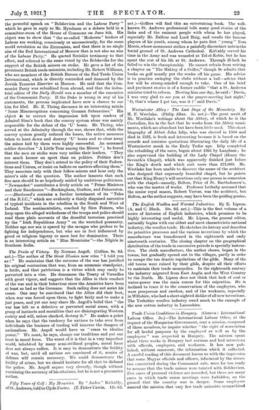The Fruits of Victory. By Norman Angell. (Collins. 8s. 6d.
net.)—The author of The Great Illusion now cries "I told you so!" He maintains that the outcome of the war has justified his original contention that war, from an economic standpoint, is futile, and that patriotism is a virtue which may easily be perverted into a vice. He denounces the Treaty of Versailles with great vigour, and suggests that the Allies in their conduct of the war and in their behaviour since the Armistice have been at least as bad as the Germans. Such railing does not assist his cause. One may be convinced that the Allies did their best, when war was forced upon them, to fight fairly and to make a just peace, and yet one may share Mr. Angel's belief that "the war has left us a defective or perverted social sense, with a group of instincts and moralities that are disintegrating Western society and will, unless checked, destroy it." He makes a point when he says that the tendency for nations to take over from individuals the business of trading will increase the dangers of nationalism. Mr. Angell would have us "cease to idealise power." We must, he says, change our traditions and put our trust in moral force. The worst of it is that in a very imperfect world, inhabited by many semi-civilized peoples, moral force does not always suffice. It is easy to demonstrate the futility of war, but, until all nations are convinced of it, armies of defence will remain necessary. We could demonstrate the futility of crime, but we should hesitate for all that to disband the police. Mr. Angell argues very cleverly, though without examining the accuracy of his citations, but he is not a persuasive author.










































 Previous page
Previous page